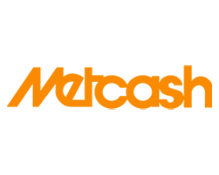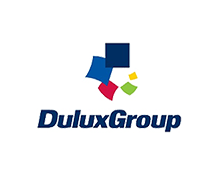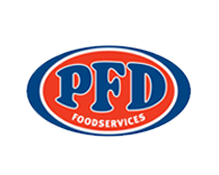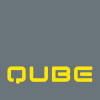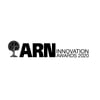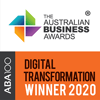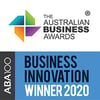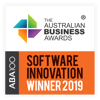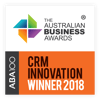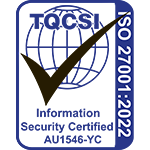Podcast transcript
AI and how it is optimising Sales Activities with Matt Michalewicz, CEO of Complexica
15/03/2019
Complexica's CEO, Matt Michalewicz, joins Steven Normann on theFuture-proof Selling podcast to discuss application areas of Artificial Intelligence in optimising sales activities
SN: Welcome to the Future Proof Selling Podcast, a show for B2B sales and business leaders where we discuss modern B2B sales strategies that will fill your pipelines and set you up for ongoing success. My name is Steven Norman and it's a pleasure to be your host. Enjoy the show.
SN: Welcome to the show, everyone. And really pleased today to have joining me, Mr. Matt Michalewicz, who is the CEO at Complexica, which is an amazing company that is in the AI field and developing AI solutions for sales and having a lot of success. So really looking forward to this discussion. So, Matt, welcome to the program.
MM: Thanks, Steven. Pleasure to be on. And thanks for having me.
SN: No problem. So let's get into it. So you're in the AI field. And so I thought we'd just start with a quick discussion on what AI is and the sort of impact it's having on industry. So could you help us?
MM: Sure. Look, I'll give you a quick overview. So I've been in the field all my working life because my father is an AI scientist. So since my earliest memories of life, since I was six, I spent after school at a university professors office listening to lectures on neural networks and machine learning and the Turing test, et cetera. So I've had a perspective over many decades on how the field has evolved and public perception, how it's changed towards A.I. from not being understood at all, to people being curious about it, to becoming a mainstream, in my view, overhyped kind of topic.
MM: And al AI is trying to do - it's a very old field, by the way, 70 years old - and all it does is tries to replicate natural processes. It's a long research area of scientists trying to replicate natural phenomenon like robotics is the attempt to replicate mechanical movement. Computer vision is the attempt to replicate the eye and the discovery of patterns or shapes or objects that I think you've got natural language processing which tries to replicate speech and interpreting speech, and you've got cognitive computing, which is the attempts to replicate brain function, things like decision making, reasoning, deduction inference and so on. So that's what AI is: a study of natural phenomena and how we could be artificially replicating it in computing environments.
SN: Oh, very good. So a lot of the attention around AI has been about replacing humans, replacing jobs. Some people talking about having 30, 40, 50 per cent unemployment, because of AI – do you have a view on the sort of impact AI is going to have on us?
MM: Yes, no one knows exactly the impact that will have. But I'll tell you that I viewed the media reports to be greatly exaggerated and overhyped. And I think the actual stage of development of A.I. is not what the public perceives it to be. So the fundamental problem is that there is an enormous amount of talk we like to say about automation, job loss, replicating humans, etc. But in the field of AI, scientists don't understand how biologically the brain works, and it's very, very difficult for them to try to replicate it in computing environments if you don't even know how the actual thing works.
MM: So this is enormous body of research that still needs to be carried out on neurology brain function, how we explore memories, memory formation, what a common definition of consciousness and awareness and how it comes to be before we make significant inroads in true AI, before all of these other things can happen. So I don't my personal view is not in our lifetimes that you're going to see a conscious machine replicating 50 percent of human beings and doing their jobs. But that sounds like a great movie or a nice front page of the newspaper to sell more copies. But it's not the real state to play in the research side of it.
SN: Sure, sure. So that would suggest that humans are better than computers at some things - like what is AI good at?
MM: AI is good on very narrow specific problems where you can take advantage of the speed of a computer, the accuracy of an algorithm. As a simplistic example, fraud detection on credit cards has been done by A.I. by neural network for a long, long time. For decades. Every time you swipe a Visa or an AMEX, a computer program makes a decision on whether to block that transaction or to approve it and so on. So that's a great example of the computer being better than a human being.
MM: You just can't have humans look at thousands of transactions a second as a particular example, but that same algorithms are going to get up and make a coffee for you and write a song and do a sales presentation and so on. So AI is finding its place in narrow domains and specific problems where you can tune algorithms to something quite exact. And usually that thing has to be repetitive and routine, just like credit card transactions are repetitive and routine. The same thing happens day in, day out. That's where eyes beginning to shine and find its feet.
SN: All right. That's good to know. Thank you. Let's move to what you're doing at Complexica. So what does Complexica do?
MM: So it's software for sales and marketing people to help them make better decisions. The problem with making good decisions in businesses, they typically require some analysis of data. So if we talk about sales and common problems that salespeople have, they might have the issue of where's the best use of my time? Which customers and prospects should I visit? What conversation point should I deliver? What products should I be offering? How should I price a package -these are common kind of questions or decisions that salespeople would have.
MM: And to answer them correctly requires a substantial amount of data analysis. You have to look at all your customers in the territory, look at prospective customers trending up and down. Who's you've got them all. Where are the opportunities? Where are you overservicing or under servicing? What value adding insights or information could you deliver to these customers and prospects once you're there? What are the conversations? What are the products you should offer? How should you price a deal?
MM: So all of that all of those things that I've just mentioned require analysis to do. They require data. They require analysis to come up with answers to these questions so that a salesperson can enact them in the field. All Complexica does is automates all of that. So a salesperson doesn't need to worry about the analysis and they're fed recommendations into their hand on a phone or a tablet: who to see, what to talk about, what to offer, how to price it, etc. It's the automation of all of the stuff that salespeople don't like to do.
SN: Wow. Well, that sounds pretty amazing. So how much progress have you made as far as being able to deliver that benefit and productivity?
MM: Yes, so the company is five years old. We've got 40 - 50 customers and we have products deployed across thousands of users that are doing this. So we found the best benefits can be extracted from sales teams that are out selling, for lack of a better word, commoditised products: building materials, alcohol, food, cleaning products and so on. We have these characteristics of a lot of products, a lot of customers and salespeople that really can't cover the whole universe of customers and prospects.
MM: And even if they could, they wouldn't have the time to do all the research, understand which products marry up the best of which opportunities, how to price them. So these are these environments that have significant complexity and yet they are significantly commoditised - it's not like you're selling a nuclear reactor - you know, you're selling it over ten years, and it's something highly engineered and customised. You're selling a widget, a bottle of alcohol or a food product or a paint brush or whatever the case might be.
MM: And if you've got tens of thousands of potential business customers that you could sell to, it becomes a significant challenge of where the best use of your time is, pricing decisions and so on. And that's where we found the best success. And we've got case studies on our website and the products are listed there. But it’sin field, it works and and delivers benefit.
SN: You're helping your sales team salespeople prioritize where they spend their time, spend their time on the best opportunities in their universe, and rather than them having to analyze that - and we know a lot of these salespeople in these high volume environments - they don't have a lot of time to do this analysis.
MM: That's right. Along with this podcast, we could attach a link to one of the applications because it's more than just analyzing prospects. The machine actually generates conversation points for the salesperson to deliver in the meeting. So you can think about how cool that would be to have your kind of your own analyst there on a phone or on your computer. Not only do they analyze the market for you, but they tell you where to go.
MM: And actually what conversations to deliver that are specific to that business, to that point in time, to that territory. And if the conversation moves to actually a sales conversation, what products to offer, this type of business is likely to buy this and how to dynamically price the deal for maximum margin, yet still being acceptable to the customer. So it's it and it comes back to what you Steven mentioned earlier. It's a specific use case of AI, which is repetitive and routine.
MM: But yet in the scale of its complexity, given the number of businesses, the number of SKUs, number of possible pricing combinations, it can be done better by a machine. But it's a far cry from the company that's going to take our job and direct a movie.
SN: Yeah. So what sort of benefits have your customers seen from using the solution?
MM: So depending on which level you're targeting: from more efficient use of time down to pricing - the benefits really fall into being able to make more sales calls each day because you're targeting better opportunities, you're more likely to hit and exceed your budget. So that's another measure. It allows sales reps to get up to speed faster. They don't have to know the whole universe of products and customers, etc. The machines is doing all the analysis for them when you're transacting, it increases the size of the basket as a revenue uplift, also increases the average margin per order, so some of this technology also runs where technology runs autonomously on websites so that when a customer engages with a portal, our software interacts with that customer and guides them towards certain buying decisions. So typically, you're making more sales calls, you're exceeding budget, you're increasing revenue per customer, and you're increasing the average margin per order as a benefit.
SN: You also said a shortened ramp time for new reps as well. Yes, that's a big deal for sales leaders, is to shorten that much as possible. So you're hitting really all the hot buttons that sales leaders are feeling pain about. I imagine you've got people queuing up for the solution.
MM: Yes, there's a lot of interest, and I've been in the business for a long time running my own AI software companies for more than 20 years. So Complexica is the third AI software business and I've worked across supply chains of many different application areas: defence, national security, etc. And I've got to tell you, from all of these experiences, I found that sales is almost this last frontier of unsophisticated activity. If you go into a supply chain function or even into a marketing function, this is a significant amount of science and sophistication that is applied to these functions where sales is still in most businesses art.
SN: Yes, it has been relationship-based.
MM: Yeah, a CEO once put it really nicely to me. He said, you know, we run a manufacturing company and I can push a button, which is called MRP Manufacturing Resource Planning and optimize my factories for me. You'll tell me what materials to order went to order them and what quantity, etc. so I can make my products and it goes out.
MM: And the CEO said there is a no button in my business that I can push that's going to optimize my sales. It's going to tell all my salespeople where to go, what conversations to have, what to offer, what the price should be, etc. And that's a big insight in the sophistication level in the system maturity, between business functions. And that was that that statement made to me in the early days of Complexica. And it had a profound impact because you kind of reflect on that - he's right: there is no red button. And all of a sudden 500 salespeople are told instantaneously where the opportunities are, what to talk about, what to offer, what to price etc. And I think that's an opportunity for sales leaders and for technology companies like Complexica.
SN: Yeah, absolutely. So what's involved in implementing something like this: is it a huge project?
MM: No, no. The amount of publicly available data is large these days, which allows us to pre-capture and pre-process the majority of data that would be quite required. If you look at food and beverage, for example, you've got all of these review sites like TripAdvisor that tell you a lot of things about venues, how popular they are, customer sentiment, operating hours, or they attach to office buildings, they serve alcohol, type of cuisine and so on.
MM: So you can go and capture all of this without being a burden on the customer that you're dealing with, assuming they're an alcohol or food supplier selling into those kind of venues. So typical projects run around three months and they really focus on integrating our software into the IP landscape of the business, which is typically an ERP environment. There's an element of configuring workflows to a particular business, workflows and a sales process and stages of the sale. And then there's the stage of deployment, testing and change management.
MM: And change management is significant in some companies because they have very old, I don't mean old by age of sales teams, but old in the sense they've always done it a certain way. And that sort of way might be their sales reps were order takers. They go around and make the same calls, have the same conversations, and if there's some order to be taken, they take the order. And now they want that sales organization to become a trusted adviser and use technology like ours to provide value, adding insights and information and so on.
MM: So the technology part can be actually quite easy in these kind of projects. What's difficult is changing an organization's sales approach to how it's always been to a new paradigm or a new model of working. And that becomes a significant element of a project.
SN: Right. And is that something that that you guys do as well, that like consulting component?
MM: Some elements. But we also work with sales training organizations that actually specialize and upskilling on the site because we’re a software company, we don't have the capability to go in and coach people and change their soft skills and upskill them. So we partner with sales training organizations and have done this to great success so that you can upscale the people to use a piece of technology that's fundamentally going to change the way they sell and talk to customers.
SN: OK. All right, so that sounds like a huge amount of benefit for the sales function of embracing this, so that sounds really exciting. So, what's next for you guys? Where are you taking this next? You're going global or are you going to be adding more applications and products to Larry or what's your direction?
MM: Yeah, both. It's a really good question. So our aspiration is to list the company on the stock exchange in Australia, on the ASX. That's still some number of years away and the business is moving in two directions at the same time. One is to increase the application suite that we offer, which means covering more problems, like, for example, in marketing, outside of sales you have promotion issues: when to run promotions. If you're a retailer, what you should range in stores, how to optimize the pricing of a promotion in-store.
MM: So there's all these personalization problems. For example, our software now has personalization engine that can be plugged in to a digital marketing function where it's personalizing the messages being sent to customers and prospects rather than blanket emails or blanket sms. So we have to expand the application suite to cover more problem areas within sales and marketing where you can really drive value through AI. And then the second one is geographic. So we started in Australia. We have a couple of offices here. We do have an office overseas, it's a testing and development office of our own company, our own employees. So the next step will be to create a sales office overseas and like London. Then the following will create one in New York or in San Francisco and step by step, move towards a global enterprise that does global implementations. And then at that point, it becomes an ideal opportunity to list on the stock exchange, raise capital and accelerate the expansion.
SN: Well, it sounds like an exciting plan.
MM: Yeah, that's hopefully it doesn't kill us in the process. The excitement can take its toll
SN: I'm sure it can be really tough in a business. But you've got great experience, I think you know how to navigate through that. So tell me about your sales approach. A lot of sales leadership, this you've got a lot of experience ramping up start up companies. Do you have some tips on how to secure success there?
MM: Yeah, really good question. So first thing that I'll say is if I look at emerging companies, not necessarily startups, but even smaller businesses, sales is usually their weakness. Usually companies die. I mean, startups, emerging companies, etc. they die not because the product doesn't work or because they've made technical mistakes etc they die because they don't sell enough to survive. This is being an entrepreneur all my life is my view of the world. And I've got a slide in entrepreneurial presentations that says, you know, if you don't sell, you don't eat and that’s a very succinct way of putting it.
MM: So, yeah, I don't think the core strength of startups is sales. Their core strength is usually a technical strength, so they start with a weakness in that area. So recognizing this early in my life, I've studied sales all my life because I viewed it as the difference between succeeding or failing. It's not going to be that my product is 10 percent better or two percent better or I'm technically more competent. Those aren't the things that are going to enable success for me. It's my ability to sell something to someone and build a sales organization and so on. So that's the kind of overarching philosophy that I have. And then and then if you go down to a business like Complexica and my last company SolveIT. We sell enterprise software. So we sell systems to big companies. We're not selling to pubs or to, you know, to fish and chip shops etc. We're selling software to businesses like Pfizer, Dulux groups, the major banks, etc. so large, significant organizations. Our typical customer is anywhere between a quarter of a billion to many billion in revenue. We've got some that are smaller, 50 million, 100 million etc, but we don't have any customers that are one million in revenue, 5 or 10 million. So we're dealing with the bigger end of town. And when you deal with the bigger end of town, you have to have a sales process that is geared towards that.
MM: We've run educational events in all cities on a regular basis. See every six weeks around AI for people that are interested from these big companies to attend, it's run over lunch. It's purely educational. From those educational sessions some are interested in exploring an area of their business, for example, sales problem or marketing problems that they have in some cases, the supply chain problem where they think AI could deliver value. From these exploratory meetings we usually run more presentations that are specific to that business and the problem.
MM: Then it moves into workshopping: what need you have what they needed what’s the workflows, etc. and then in our sales process, we present a proof of concept proposal. So this is the step between presentations, workshops and doing a full project as a way of de-risking the step that a business makes between nothing and a software system. And the proof of concept engagement might be for six to eight weeks, depending on the scope and complexity where we're using real customer data, real workflows, and we're demonstrating in this software application how the problem can be solved.
MM: And then we present the proposal for the actual software project, which becomes the actual thing that you deploy. So it's a nice kind of sales process of stages from identifying companies that might have an interest to educating them to doing an internal meetings, workshops, etc., to getting to a proof of concept and then post- proof of concept, having a business case and a full software proposal for deployment. And that's the process we run from beginning to end.
SN: Yeah, wow. Well, I think you said something really profound there early, that having a good sales function is the difference between success and failing. And even though you have a great background in technology, you've got a very differentiated product. You recognize that that's not enough to be successful.
MM: Yeah, there's a great saying, Stephen, that most mousetraps that are better than the previous mousetrap are never sold. They're never commercialized because people don't know how to sell them. So having something that's better, like a better mousetrap, it's not enough. I totally agree with that statement.
SN: Yep, absolutely. Absolutely. Yeah. Because we have a long history of great products and better products and great solutions that never get anywhere. I see a lot of these entrepreneurial companies that they may get up to three million, five million, 10 million, maybe just with the energy of the founder and maybe some contacts or some very early adopters for that product. But they have no idea how to really scale that up and get that to the next level. And that's where sales comes in. So I think that that's a great lesson for all of us to hear that from you as well.
Yeah, couldn't agree more.
SN: All right. So anything else you'd like to share about that, what you're doing or what Complexica is doing?
MM: And yeah, look, I think if I think about the audience being sales leaders and sales in general, I've got to tell you that being a salesperson myself as an entrepreneur and building software for sales people, the one additional insight or observation that I've come across is that the world has become more sophisticated over the last 10, 15 years, and customers are expecting more from the sales people that visit them. And these are all like by customer I mean, any kind of customer service.
MM: You're a restaurant owner, you're now expecting more from the sales reps that visit you. You're expecting some kind of information, some kind of insight, some kind of a value adding. So customers want to deal with salespeople that can educate them and can help them succeed. And so I feel like salespeople are having to raise their game in this new world, in all industries to stay relevant and hold the attention of the customers that they're serving. This seems like a pretty profound shift in the area of sales.
SN: Yeah, absolutely. It's not enough to do the old “show up and throw up” or just going to about ourselves and our products. On someone that maybe understands the restaurant business is dealing with 20 other restaurants and can give him some ideas on how to improve his marketing or how to reduce his wastage in the kitchen or something that is important to his priorities. Right?
MM: Correct. Yeah. There's a there's an analogy we like to use from the alcohol industry that in the past, alcohol sales people would go in and would say, hey, here's a wine sales rep and here's Shiraz that we have on a deal at the moment, I think it would work in your venue. And that whole conversation is a push conversation. You know, I'm walking in, I'm trying to push the product into the venue. But if I were to take that same analogy, same example, if I were to go into the venue and forget my product for a second and I was to tell the venue owner, hey, did you know that in this suburb, restaurants like yours, red wine sales have gone up 15 percent in the last two months and it's been driven by the Shiraz category.
MM: And these three products in particular, you're not carrying them. Your competitors are they have them on the menu in the bottle shop and are flying off the shelf or flying off the menu. If I gave you that kind of insight or that kind of information, most likely that venue will say, well, can I have that? How much is it? Can you supply it if they want to succeed and if it's popular, they want to be selling what's popular?
MM: That's an example of a pull I've created, pull, because I've educated you and I've told you something you didn't know. And that information, if you act on it, can help you succeed, can help you sell more. And it just so happens to be that I offer these three products that are in the portfolio range that that we serve. So I see sales moving in towards that direction. And salespeople and sales organizations that have these kind of conversations are the ones that are going to be successful in the future, not the people that come in and push or that ask you what's going on or how is it going, etc. I think I think that's dying off as a conversation.
SN: Yeah, absolutely. I see that everywhere. It's a big trend. And you guys have got a great tool to give salespeople the right message for the right customer at the right time. So, yeah, I think that fits in very well with the way sales is trending. So sure, it's going to be attractive to a lot of folks.
MM: You know it's an exciting time.
SN: Yeah, absolutely. And really excited to see an Australian company doing so well and really wish you a lot of luck. I'm sure it's going to be a massive success.
MM: And I really appreciate it, very kind of you to say.
SN: Thank you Matt and thanks everyone for listening and look forward to engaging with you more. Bye for now.
"Larry will be our digital expert that will enable our sales team and add that technological advantage that our competitors don't have."
Kerry Smith
CEO, PFD Foods
$1.6 billion in revenue 
"Lion is one of Australasia’s largest food and beverage companies, supplying various alcohol products to wholesalers and retailers, and running multiple and frequent trade promotions throughout the year. The creation of promotional plans is a complicated task that requires considerable expertise and effort, and is an area where improved decision-making has the potential to positively impact the sales growth of various Lion products and product categories. Given Complexica’s world-class prediction and optimisation capabilities, award-winning software applications, and significant customer base in the food and alcohol industry, we have selected Complexica as our vendor of choice for trade promotion optimisation."
Mark Powell
National Sales Director, Lion
"At Liquor Barons we have an entrepreneurial mindset and are proud of being proactive rather than reactive in our approach to delivering the best possible customer service, which includes our premier liquor loyalty program and consumer-driven marketing. Given Complexica’s expertise in the Liquor industry, and significant customer base on both the retail and supplier side, we chose Complexica's Promotional Campaign Manager for digitalizing our spreadsheet-based approach for promotion planning, range management, and supplier portal access, which in turn will lift the sophistication of our key marketing processes."
Richard Verney
Marketing Manager
Liquor Barons

"Dulux is a leading marketer and manufacturer of some of Australia’s most recognised paint brands. The Dulux Retail sales team manage a diverse portfolio of products and the execution of our sales and marketing activity within both large, medium and small format home improvement retail stores. We consistently challenge ourselves to innovate and grow and to create greater value for our customers and the end consumer. Given the rise and application of Artificial Intelligence in recent times, we have partnered with Complexica to help us identify the right insight at the right time to improve our focus, decision making, execution, and value creation."
Jay Bedford
National Retail Sales Manager
Dulux

"Following a successful proof-of-concept earlier this year, we have selected Complexica as our vendor of choice for standardizing and optimising our promotional planning activities. Complexica’s Promotional Campaign Manager will provide us with a cloud-based platform for automating and optimising promotional planning for more than 2,700 stores, leading to improved decision-making, promotional effectiveness, and financial outcomes for our retail stores."
Rod Pritchard
Interim CEO, Metcash - Australian Liquor Marketers
$3.4 billion in revenue 
"After evaluating a number of software applications and vendors available on the market, we have decided to partner with Complexica for sales force optimisation and automation. We have found Complexica’s applications to be best suited for our extensive SKU range and large set of customers, being capable of generating recommendations and insights without burdening our sales staff with endless data analysis and interpretation.
Aemel Nordin
Managing Director, Polyaire
"DuluxGroup is pleased to expand its relationship with Complexica, a valued strategic partner and supplier to our business. Complexica’s software will enable DuluxGroup to reduce the amount of time required to generate usable insights, increase our campaign automation capability, personalise our communications based on core metrics, and close the loop on sales results to optimise ongoing digital marketing activity."
James Jones
Group Head of CRM, DuluxGroup
"Instead of hiring hundreds of data scientists to churn through endless sets of data to provide PFD with customer-specific insights and personalised recommendations, Larry, the Digital Analyst® will serve up the answers we need, when we need them, on a fully automated basis without the time and manual processes typically associated with complex analytical tasks.”
Richard Cohen
CIO, PFD Foods
$1.6 billion in revenue 
"As a global innovator in the wine industry, Pernod Ricard Winemakers is always seeking ways to gain efficiencies and best practices across our operational sites. Given the rise of Artificial Intelligence and big data analytics in recent times, we have engaged Complexica to explore how we can achieve a best-in-class wine supply chain using their cloud-based software applications. The engagement is focused on Australia & New Zealand, with a view to expand globally."
Brett McKinnon
Global Operations Director, Pernod Ricard Winemakers
"70% - 80% of what we do is about promotional activity, promotional pricing -- essentially what we take to the marketplace. This is one of the most comprehensive, most complex, one of the most difficult aspect of our business to get right. With Complexica, we will be best in class - there will not be anybody in the market that can perform this task more effectively or more efficiently than we can."
Doug Misener
CEO, Liquor Marketing Group
1,400+ retail stores 
"The key thing that makes such a difference in working with Complexica is their focus on delivering the business benefits and outcomes of the project."
Doug Misener
CEO, Liquor Marketing Group
1,400+ retail stores 
"Australia needs smart technology and people, and it has been a great experience for me to observe Complexica co-founders Zbigniew and Matt Michalewicz assemble great teams of people using their mathematical, logic, programming, and business skills to create world-beating products. They are leaders in taking our bright graduates and forging them into the businesses of the future."
Lewis Owens
Chairman of the Board, SA Water 
"Having known the team behind Complexica for some years ago now, I am struck by their ability to make the complex simple - to use data and all its possibilities for useful purpose. They bring real intelligence to AI and have an commercial approach to its application."
Andrew McEvoy
Managing Director, Fairfax Media - Digital 
"I have worked with the team at Complexica for a number of years and have found them professional, innovative and have appreciated their partnership approach to delivering solutions to complex problems."
Kelvin McGrath
CIO, Asciano 
“Working with Complexica to deliver Project Automate has been a true partnership from the initial stages of analysis of LMG’s existing processes and data handling, through scoping and development phase and onto delivery and process change adoption. The Complexica team have delivered considerable value at each stage and will continue to be a valued partner to LMG."
Gavin Saunders
CFO, Liquor Marketing Group 
“Complexica’s Order Management System and Larry, the Digital Analyst will provide more than 300 Bunzl account managers with real-time analytics and insights, to empower decision making and enhanced support. This will create more time for our teams to enable them to see more customers each day and provide the Bunzl personalised experience.”
Kim Hetherington
CEO, Bunzl Australasia 
"The team behind Complexica develops software products that are at the cutting edge of science and technology, always focused on the opportunities to deliver a decisive competitive edge to business. It has always been a great experience collaborating with Matthew, Zbigniew and Co."
Mike Lomman
GM Demand Chain, Roy Hill Iron Ore 
"The innovations that the Complexica team are capable of continue to amaze me. They look at problems from the client side and use a unique approach to collaborating with and deeply understanding their customers challenges. This uniquely differentiates what they bring to market and how they deliver value to customers."
John Ansley
CIO, Toll Group 
"Rather than building out an internal analytics team to investigate and analyse countless data sets, we have partnered with Complexica to provide our sales reps with the answers they need, when they need them, on a fully automated basis. We are excited about the benefits that Larry, the Digital Analyst will deliver to our business.”
Peter Caughey
CEO, Coventry Group 
“Complexica’s Order Management System and Larry, the Digital Analyst will provide more than 300 Bunzl account managers with real-time analytics and insights, to empower decision making and enhanced support. This will create more time for our teams to enable them to see more customers each day and provide the Bunzl personalised experience.”
Kim Hetherington
CEO, Bunzl Australasia 
"After an evaluation process and successful proof-of-concept in 2016, we have chosen to partner with Complexica to upgrade the technological capability of our in-field sales force. The next-generation Customer Opportunity Profiler provided by Complexica will serve as a key tool for sales staff to optimise their daily activities, personalise conversations and interactions with customers, and analyse data to generate actionable insights."
Stephen Mooney
Group Sales Capability Manager, DuluxGroup
$1.7 billion in revenue
"After evaluating a number of software systems available in the marketplace, we have ultimately selected Complexica as our vendor of choice for sales force automation and CRM. Given the large SKU range we carry and very long tail of customers we serve, Complexica’s applications are best suited to deal with this inherent complexity without burdening our staff with endless data entry."
Nick Carr
CEO, Haircaire Australia
Australia's largest distributor of haircare products
“Asahi Beverages is Australia’s largest brewer, supplying a leading portfolio to wholesalers and retailers, including some of Australia’s most iconic brands. Last year Asahi Beverages acquired Carlton & United Breweries, which is its Australian alcohol business division. To harness the strength of our expanded portfolio, we partner with our customers to run multiple and frequent trade promotions throughout the year, delivering long-term growth for both our business and theirs. Given the inherent complexity in optimising promotional plans and our continued focus on revenue and growth management, we have selected Complexica as our vendor of choice after a successful Proof-of-Concept of its world-class optimisation capabilities.”
Kellie Barnes
Group Chief Information Officer
Asahi Beverages
"Dulux is a leading marketer and manufacturer of some of Australia’s most recognised paint brands. The Dulux Retail sales team manage a diverse portfolio of products and the execution of our sales and marketing activity within both large, medium and small format home improvement retail stores. We consistently challenge ourselves to innovate and grow and to create greater value for our customers and the end consumer. Given the rise and application of Artificial Intelligence in recent times, we have partnered with Complexica to help us identify the right insight at the right time to improve our focus, decision making, execution, and value creation."
Jay Bedford
National Retail Sales Manager, DuluxGroup
"At Liquor Barons we have an entrepreneurial mindset and are proud of being proactive rather than reactive in our approach to delivering the best possible customer service, which includes our premier liquor loyalty program and consumer-driven marketing. Given Complexica’s expertise in the Liquor industry, and significant customer base on both the retail and supplier side, we chose Complexica's Promotional Campaign Manager for digitalizing our spreadsheet-based approach for promotion planning, range management, and supplier portal access, which in turn will lift the sophistication of our key marketing processes."
Richard Verney
Marketing Manager, Liquor Barons




